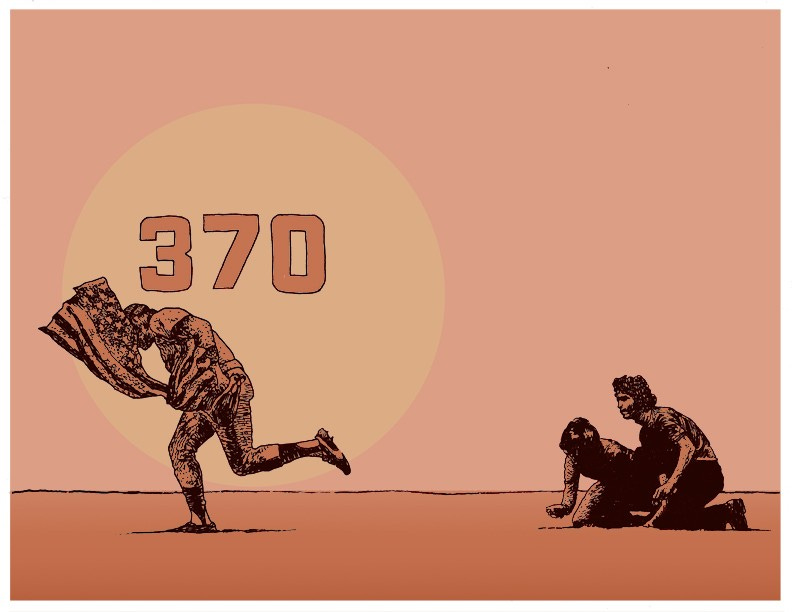
On April 25, 1976, a father and son scurried onto the field at Dodger Stadium in the middle of a game between the Dodgers and Chicago Cubs. They knelt in the outfield grass and unfurled an American flag. The little boy handed his father a lighter, but before the father could set fire to the flag —
Rick Monday came sweeping in. Monday, who was playing center field for the Cubs that afternoon, was a classic All-American type. He was even a local boy, born and raised in LA, grown tall and athletic under that Southern California sun. He was the #1 pick in the first ever Major League Baseball draft.
The incident became a national story, and one particular photograph of Monday sprinting away from the protesters, flag in hand, became an enduring image of baseball and Americana. Monday would go on to play for the Dodgers. He is now a beloved longtime radio announcer for the club.
But who were the father and the son on the field? What brought them to this desperate point? For Rick Monday to save the flag and achieve his place in the folklore of the national pastime, there had to be somebody putting that flag in peril.
William Errol Thomas was 37 years old. He was Native American. He had come to Los Angeles from rural Missouri. The newspaper reports were conflicted — either Thomas was protesting something very broad: the generations of horrible mistreatment of Native Americans; or very specific: his wife’s imprisonment in a mental institution in Missouri against her will.
To my mind both of those causes were worthy ones. But you also don’t burn an American flag in the middle of a major league stadium with your kid by your side unless you have reached a point of some desperation. In a wonderful feature for VICE Sports a few years back, David Davis tracked down members of the Thomas family:
It's understandable that the Thomas family prefers silence. They have been vilified from the moment they ran onto the field. Even today, they continue to be publicly chastised and shamed. They remain a frustratingly nebulous void—they can be whatever sort of villain an observer wants them to be. The comment section below a recent re-telling of the story on the website ConservativeVideos.com described them as "two scumbags," "possibly illegal aliens," "Muslims," and "war protesters." One asked: "Were the names of the two perps Bill Ayers and Bernadine Dorn?"
With their disappearance, with their refusal to address the past, they leave behind questions that seem likely to remain unanswered: What pain and rage led them out on to the field that day, and what did it have to do with that mental institution in Missouri? Why burn an American flag as a method of protest, and why at Dodger Stadium? And, why did a father use his 11-year-old son as an accomplice? In the long silence that followed the moment, there are surely other questions—questions of regret, questions about what it has been like to live with this for 40 years.
The thing is, even if they spoke…who would listen? In our country, we have constantly chosen to value the symbol over what the symbol represents: the flag, the anthem, the office, the Confederate statue. We have constantly chosen to cling to comforting mythologies about the past instead of reckoning with the discomfiting present.
William Errol Thomas spent a few days in jail and then, as Davis notes, quickly disappeared from public view. Despite repeated efforts to undermine this particular act of free speech, it’s still legal to burn an American flag in America (though not on the field at Dodger Stadium). To me, this fact is more meaningful and more important than the flag itself.
As we trudge into this 4th of July weekend, let’s look upon the flags and the fireworks and the celebrations of America and all of its Paul Reveres and Abraham Lincolns and Rick Mondays — then turn our attention to the William Errol Thomases; to the desperation that brought us to this very moment in time. Thomas never actually managed to set fire to his flag on the outfield grass at Dodger Stadium, but we’re living in denial if we can’t see it now: flags are burning all over this country, they’ve been aflame for centuries, and pretending otherwise isn’t going to put them out.



You forgot to mention the part where Mr. Thomas threw the lighter fluid at Rick Monday.
Good piece. Just to set the record straight, Monday was born in Arkansas. He did attend high school in Santa Monica, CA., played his college ball at Arizona State, and has been a Florida resident for many years.